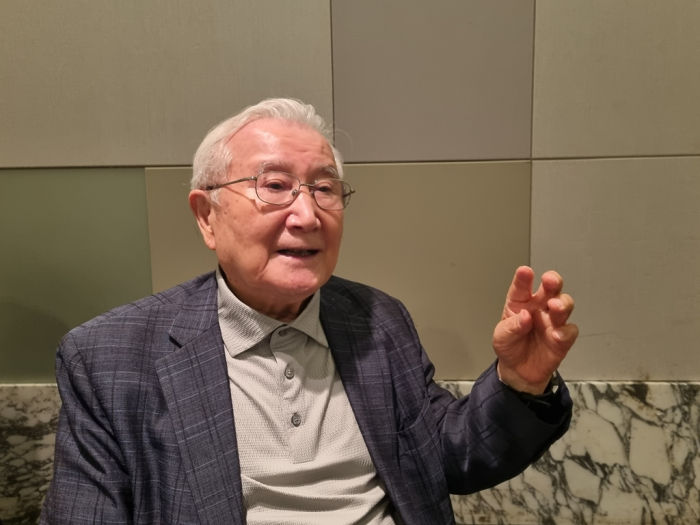Korean chipmakers
Ex-Samsung exec says Korea chip sector needs more support
A semiconductor pioneer urges the government to tackle issues on manpower shortage and regulations for competition, survival
By Jun 22, 2022 (Gmt+09:00)
4
Min read
Most Read
LG Chem to sell water filter business to Glenwood PE for $692 million


Kyobo Life poised to buy Japan’s SBI Group-owned savings bank


KT&G eyes overseas M&A after rejecting activist fund's offer


StockX in merger talks with Naver’s online reseller Kream


Mirae Asset to be named Korea Post’s core real estate fund operator



South Korea’s semiconductor sector needs more support from the government not only to compete against global rivals backed by their own governments but for their very survival, a former Samsung Electronics Co. executive and industry veteran said.
Kim Kwang-gyo, a former head of Samsung’s semiconductor research center, told The Korea Economic Daily in an interview on Wednesday that the government values the industry too lightly even though intensifying global competition threatens the domestic sector. South Korea is home to the world’s two largest memory chipmakers – No. 1 Samsung and No. 2 SK Hynix Inc.
“Competition in the semiconductor industry is so fierce that major players need to fight with key rival countries revealing how much they invest and how good their technology is,” said the 82-year-old veteran said. “But the Korean government takes the semiconductor industry too lightly.”
Kim is regarded as among the masters that established the foundation of the country’s semiconductor industry.
CUT-THROAT COMPETITION
He led Samsung’s semiconductor research center for four years since 1979 when the company set up the institute. Kim was also the head of Samsung’s research institute in Princeton, New Jersey until the early 2000s, as well as the first president of the Korean Society of Semiconductor & Display Technology (KSDT).
“The current competitive environment is much fiercer than about 30 to 40 years ago when I was working,” Kim said. “Everybody knows the US, China and Taiwan significantly invest in the semiconductor ecosystem, but Korea stands idle.”
The investment or will of a single company cannot keep the No. 1 position amid the current cut-throat competition, Kim stressed.
The US decided to spend $10.5 billion on talent development in the semiconductor industry from this year to 2026, according to the KSDT. Taiwan set up a strategy to secure a new labor force of 10,000 a year for the sector. Compared to them, South Korea has not done much even as the sector has been suffering from a manpower shortage, Kim said.
LESSON FROM SAMSUNG
Kim said the government needs to take a lesson from Samsung’s success in the industry. The tech giant started the business in 1974 with an acquisition of a local company at $500,000.
Samsung struggled in the sector with its technology evaluated as behind more than 10 years compared to that of the US and Japanese competitors in the early stage, according to Kim.
“At that time, the situation was so poor that some staff said they would quit if they were transferred to the chip unit,” Kim recalled. “We were embarrassed and despised by Japanese companies that said ‘you are not at that level yet,’ when we asked them to cooperate or introduce technology.”
Despite such difficulties, the late Lee Byung-chul, Samsung Group founder, focused on the development of the technology workforce to become the world’s top player in the sector, Kim said. The sustained investment helped Samsung take the throne in the memory chip business, he added.
Samsung stood out in the global memory chip market in the 1980s, taking advantage of three bullish factors – low oil prices and interest rates, as well as a weaker won.
“We must prepare to seize an opportunity.”
SUPPORT FOR SURVIVAL
South Korea’s semiconductor industry may fall to ruin if the current manpower shortage and tough regulations sustain, Kim warned.
“We cannot guarantee (a survival) in this cut-throat competition even if the government and academia actively support companies to work properly,” he said. “The government should change its attitude toward the semiconductor industry first.”
The country will lose all of the future growth engines if it gives up the top rank in the sector since all industries such as the smartphone, automobile and robot businesses use semiconductors, he said.
“We need to take bold steps to solve issues on the manpower shortage and regulations with a determination that we should not lose the No. 1 position. Otherwise, we will all die.”
The global semiconductor sales are forecast to nearly double to 1,268 trillion won ($972 billion) by 2030 from 702 trillion won last year.
Kim welcomed the current government’s move to start discussions on supporting measures, adding “I hope the country consider a comprehensive strategy together.”
Write to Ji-Eun Jeong at jeong@hankyung.com
Jongwoo Cheon edited this article.
More to Read
-
 The Deep DiveWhy Korean chipmakers struggle with talent shortages
The Deep DiveWhy Korean chipmakers struggle with talent shortagesJun 10, 2022 (Gmt+09:00)
6 Min read -
 Korean chipmakersKorea losing ground in semiconductor talent development
Korean chipmakersKorea losing ground in semiconductor talent developmentMay 09, 2022 (Gmt+09:00)
3 Min read -
 Korean chipmakersSamsung, SK Hynix scramble for talent amid a lack government support
Korean chipmakersSamsung, SK Hynix scramble for talent amid a lack government supportMay 06, 2022 (Gmt+09:00)
6 Min read
Comment 0
LOG IN


